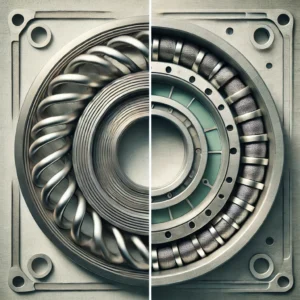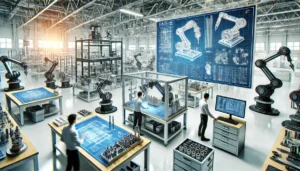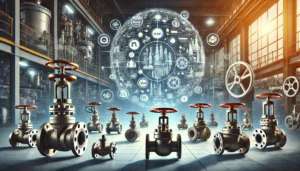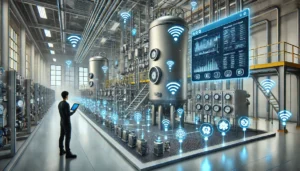The significance of instrumentation in process automation cannot be overstated. It provides the basis for measuring, regulating, and optimizing industrial activities. Processes such as temperature, pressure, flow, and level are crucial parameters and instrumentation facilitates their accurate measurement and control. This not only guarantees increased efficiency in the process but also improves accuracy. It is critical for industries today to adapt and implement advanced instrumentation to help enhance overall performance and lower costs while maintaining a certain level of quality from their products.
Understanding Instrumentation in Process Automation
Instrumentation refers to the art and science concerned with the measurement and control of physical quantities in an industry. It involves sensors, transmitters, controllers, actuators, and HMIs systems that need to be integrated for the effective operation of any system. In process automation, one of the major roles of the instrumentation systems is to control and monitor the state of different process variables and make automatic actions to maintain process control. This technology enables precisely, accurately, and reliably machines and automated systems perform many complex tasks, easily, thus making the overall process a success.
Key Components of Instrumentation Systems
- Sensors and Transmitters: The process of monitoring physical parameters of temperature, pressure, flow, and level starts with sensors. These sensors take the necessary measurement and transform it digitally into an electrical signal through transmitters. The electrical signal is sent to the converters. The received data is then sent to controllers to be processed.
- Controllers: Controllers get the signal from the transmitters and compare them with the setpoints. The controller then receives the desired setpoint and calculates the difference between the two parameters. If the measured values do not match the setpoints, the controller produces output signals which are delivered to actuators, granting the actuator’s system to activate the conditions that are required.
- Actuators: Actuators are mechanical devices that respond to control signals from the controllers. These performed physical changes within the system via the opening or closing of valves, the spinning of motors, or running of pumps that dictate the process flow, temperature, or pressure.
- Human-Machine Interfaces (HMIs): HMIs allow an assigned operator to monitor, control, and interact with the system. These interfaces show live data as well as system performance and allow operators to take necessary actions in case of any real time problems.
Enhancing Accuracy Through Instrumentation
The major objective of instrumentation within process automation is improved accuracy. Even the smallest abnormal variations in the ideal conditions while working in an industry can lead to inefficiencies, product failures, or even safety issues. There is a piece of equipment designed specifically for instrumentation which measures and adjusts process variables automatically that help keep operations within precise tolerances.
Take a chemical plant as an example. It is crucial to maintain a specific temperature during a reaction to achieve a certain chemical target. A system with adequate instrumentation in place, which adjusts and monitors temperature throughout the process, ensures that the reaction is controlled so that it does not overheat or underheat. The accurate pressure and flow reading also supplied through pipeline systems guarantee that the fluid gets to its destination without leaks or low pressure.
Instrument technology allows the systems to offer dependable and repeatable outcomes which is a necessity in quality control in manufacturing. The combination of precise control and measurement increases the product’s quality by reducing errors and variability, thus directly improving the overall quality of production.
Improving Efficiency with Instrumentation
Definition of Efficiency in Industrial Operations involves Waste Reduction, Energy Optimizing, Downtime Minimizing, and Maxim Productivity. Instrumentation provides such advancements, in addition to aiding accuracy. devices can be incorporated into the calculations of making processes more efficient. Those devices enable adjustments to be made in real time. Changes can also be combined in changes made beforehand. Further, I’ll elaborate.
- Process Optimization: Instrumentation systems allow for continuous monitoring of key performance indicators (KPIs) such as pressure, temperature, and flow. With this data, operators and control systems can make real-time adjustments to optimize the process, ensuring that resources are used efficiently without compromising on quality.
- Predictive Maintenance: Predictive Maintenance Validates instrumentAl systems aid in automating processes. This account is one of the better ones. predictive maintenance is considered as a hot topic currently, and for a reason. By instrumenting a system is constantly checked for the health statuses, any problems that may arise will be flagged. Doing this on time helps save a lot of money from breakdowns, minimize downtime, and get more work done. In order to keep profiting, companies need to make sure that their systems are not harmful to employees’ health. predicted maintenance can aid in prolonging the machine’s life.
- Energy Management: The consumption of energy is exorbitant in the industrial and manufacturing sectors. Millions of dollars can be saved and energy wasted can be reduced if energy is managed efficiently. Apart from the needless burning of energy, there is an environmental toll that has to be paid as well. Through Instrumentation, it is possible to pinpoint the problems that are creating excessive wastage, such as over cooling or heating, malfunctioning pumps, and flow restriction devices that are not functioning adequately. Companies can achieve substantial savings in their energy and operational costs by solving these problems.
Uses of Instrumentation in Different Industries
In order to achieve optimal efficiency in businesses, Instrumentation systems are a necessity in every industry as these have their own distinct areas of specialization. Here are some of the primary industries which are benefited from automation in instrumentation technology:
- Chemical Industry: For product safety and quality, it is essential to regulate chemical reactions precisely. Instrumentation is utilized in chemical processing to control and monitor pressure, temperature, flow, and pH ensure that all these parameters remain within safe and predetermined limits.
- Oil and Gas: In oil and gas, instrumentation systems take a more of a supervisory role. These systems monitor and control the material flow within the pipelines and also automate the pressure and temperature levels. They are also important for avoiding leaks and other dangerous problems and ensuring that the equipment is safe and in good working order.
- Pharmaceuticals: An Instrumentation System manages parameters like temperature, humidity, airflow in clean rooms. Furthermore, active ingredients and pharmaceutical chemicals are monitored carefully to determine whether they comply with regulations and are safe to use.
- Food and Beverage: Automation Systems in Food and Beverage Industries regulate temperature, pressure, and even flow to maintain product quality. For example, during pasteurization and refrigeration, systems control temperature and time to help retain the safety and quality of the food.
Advancements in Instrumentation Technologies
In the past few years, new inventions have been made in instrumentation, which have broadened the scope of automation systems in process control. These are:
- Wireless Instrumentation: The availability of wireless sensors and transmitters has improved the installation and servicing of pneumatic systems in difficult and dangerous locations. Complex wiring is unnecessary, thus cutting costs and setting up remote monitoring locations is easier.
- Smart Sensors: Smart sensors are advanced more sophisticated sensors that have processing capabilities. They can analyze data and perform self-diagnostics, thus reducing the need for further processing. They incorporate faster measurement which improves overall response times in critical systems.
- Integration with the Industrial Internet of Things (IIoT): The instrumentation systems are gradually being integrated with the IIOT which allows manufacturers to gather and utilize significant data from all areas of their businesses. This integration supports advanced analysis, continuous monitoring, and even remote control of systems, all of which enhance process management and overall decision making.
Challenges and Considerations
While the advantages of using instrumentation for process automation are evident, there are some issues and risks that need attention. These consist of:
- Data Security: With the expansion of industrial systems, a major issue is the difficult effort of ensuring security for the transmitted data. Protecting sensitive data from unauthorized access and cyber threats is an important challenge for many industries that make use of the instrumentation’s capabilities.
- System Integration: The advent of new instrumentation technologies is not easily incorporated into the existing systems and schedules, and often requires substantial expenditure. The older and newer systems need to work together in what is referred to as a hybrid environment which if not done can result in massive problems.
- Adjustment and Servicing: To attain the threshold of precision in system performance, each instrumentation system must undergo regular maintenance. Faulty or poorly operated sensors or actuators can cause erroneous measurements which may lead to serious inefficiencies or safety threats.
Conclusion
The importance of instrumentation in the automation of processes cannot be understated as it improves the accuracy and efficiency of industrial systems. By assisting businesses in production optimization, waste minimization, and quality improvement, instrumentation helps enhance business profitability. As the global environment grows more automated, instrumentation’s contribution in process automation will increase, helping to make industries more competitive. From energy efficiency to predictive maintenance and from improving product consistency, the ever-evolving technology of instrumentation will continue to encourage growth and development across multiple industries.










